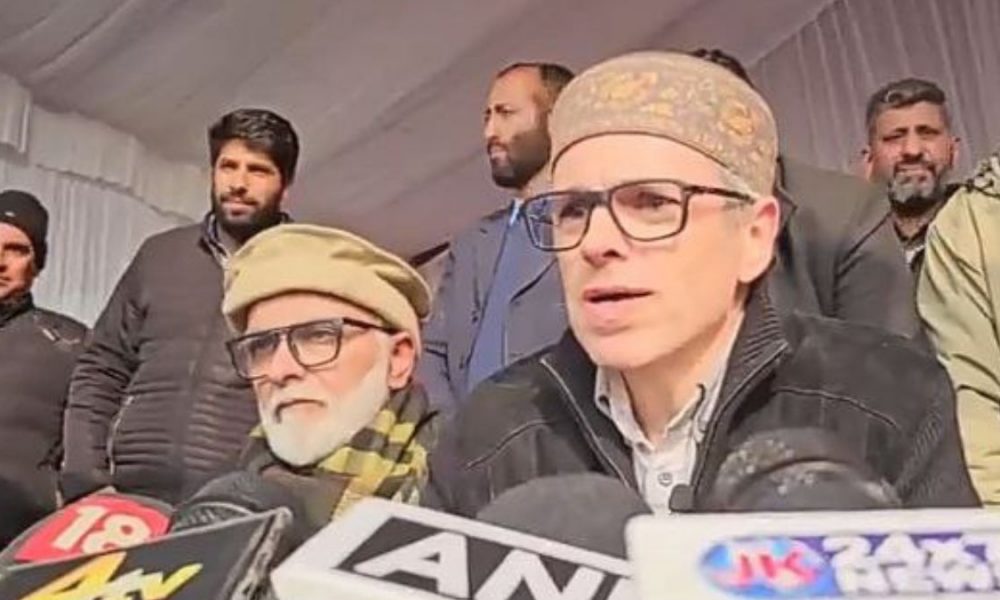
Baramulla: Ahead of the Supreme Court verdict on the revocation of Article 370 on Monday, National Conference (NC) Vice President Omar Abdullah said that he is hoping to get justice and they are eagerly awaiting the judgement in favour of the people of Jammu and Kashmir.
A Constitution Bench headed by Chief Justice of India (CJI) DY Chandrachud is set to pronounce its verdict on Monday t on a batch of petitions challenging the abrogation of Article 370 of the Constitution, which granted special privileges to Jammu and Kashmir.
Omar Abdullah said, “When we went to the Supreme Court in 2019, we went with the hope of justice, even today our feelings are the same. We were eagerly waiting for this day. Tomorrow, the judge will give his verdict, we hope for justice…”
#WATCH On Article 370, National Conference Vice President Omar Abdullah said, “When we went to the Supreme Court in 2019, we went with the hope of justice, even today our feelings are the same. We were eagerly waiting for this day. Tomorrow, the judge will give his verdict, we… pic.twitter.com/4HVriiXqXW
— ANI (@ANI) December 10, 2023
He said he can only hope and pray the decision is in favour of the people of Jammu and Kashmir.
The Centre bifurcated the erstwhile state of Jammu and Kashmir into two Union territories.
Meanwhile, Jammu and Kashmir People’s Conference leader Sajad Gani Lone said that we have all faith in the court and hoping for a decision in favour of the people of Jammu and Kashmir.
“We have all our hopes from the court. I think we were the first petitioners to go to the court. We still have faith in the court and are hoping that the decision is in favour of the people of J-K,” Lone said.
#WATCH | On Article 370, J&K People’s Conference leader Sajad Gani Lone says, “We have all our hopes from the court. I think we were the first petitioners to go to the court. We still have faith in the court & are hoping that the decision is in favour of the people of J&K…” pic.twitter.com/C6q54R3fTd
— ANI (@ANI) December 10, 2023
A five-judge constitution bench comprising Chief Justice of India DY Chandrachud, Justices Sanjay Kishan Kaul, Sanjiv Khanna, BR Gavai, and Surya Kant will pass the judgement on Monday.
The Constitution Bench was hearing a batch of petitions challenging the abrogation of Article 370 of the Constitution and bifurcating the state into two Union Territories.
Several petitions were filed in the top court, including those of private individuals, lawyers, activists, politicians and political parties challenging the Jammu and Kashmir Reorganisation Act, 2019, which splits Jammu and Kashmir into two Union Territories: Jammu and Kashmir and Ladakh.
On August 5, 2019, the Central government announced the revocation of the special status of Jammu and Kashmir granted under Article 370 and split the region into two union territories.
On September 5, the apex court reserved the judgement after hearing the arguments for 16 days.
The central government had defended its decision to abrogate Article 370, saying there was no “constitutional fraud” in repealing the provision that accorded special status to the erstwhile state of Jammu and Kashmir.
Attorney General R Venkataramani and Solicitor General Tushar Mehta appeared for Centre.
The Centre had told the bench that Jammu and Kashmir was not the only state whose accession to India was through instruments of accession, but many other princely states that too had joined India post-independence in 1947, with conditionalities and after their merger, their sovereignty was subsumed in the sovereignty of India.
The Central government had defended its decision to abolish Article 370 in Jammu and Kashmir, saying that after the changes, street violence, which was engineered and orchestrated by terrorists and secessionist networks, has now become a thing of the past.




